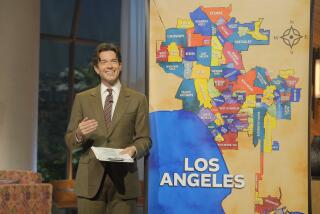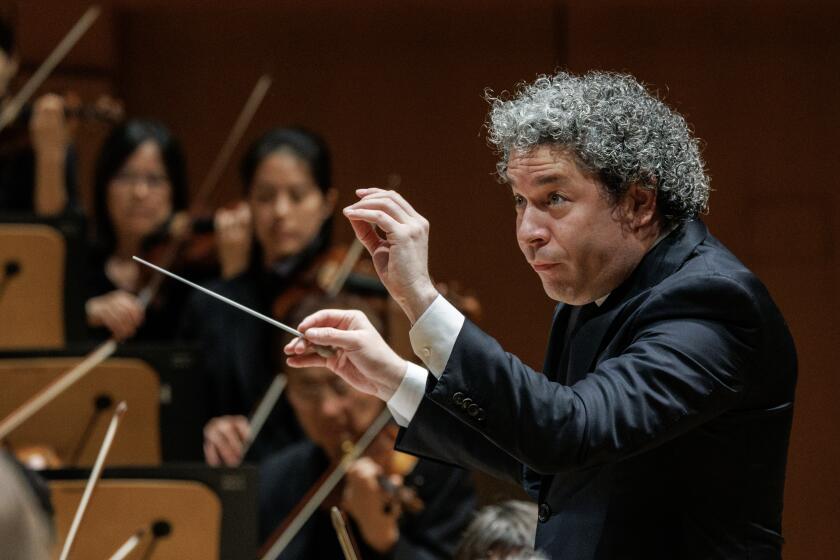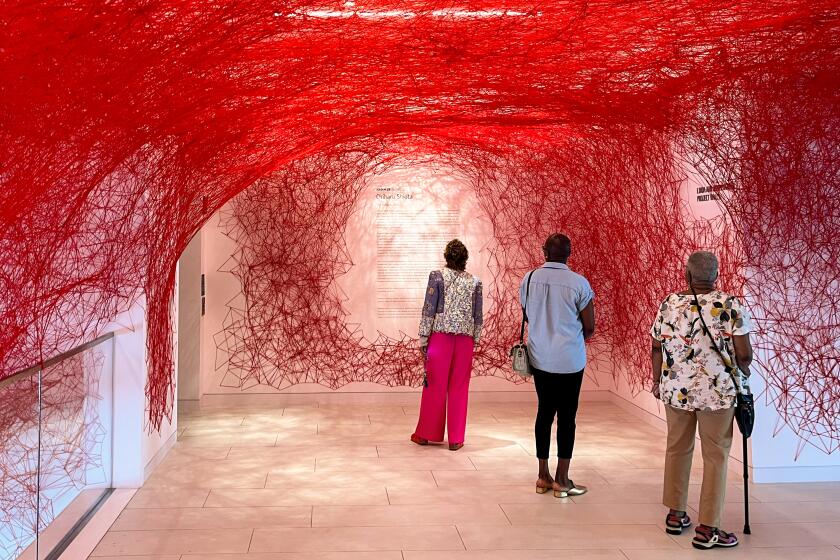HILLS ARE ALIVE WITH PLAYS
Padua Hills lives on. After a bumpy start this year (including a previously announced cancellation), the 10th annual Padua Hills Playwrights’ Workshop/Festival has touched down at the Boyd St. Theatre, where, beginning Thursday, five new pieces will be performed in repertory.
“It feels like a miracle that we’ve done it--because it’s been a struggle every year,” offered artistic director Murray Mednick. “Since we left Pomona (College) four years ago, we’ve had to scramble to find a place. But we’re strong in our company of people, which has a common aim, common interests: to work in an intense, supportive, open, free way. There’s no artistic director telling them if it’s good or bad. I hardly ever do that.”
Mednick responds hotly to the charge of nepotism.
“The principle of Padua Hills is not so much developing plays--but playwrights ,” he continued. “Continuity is what’s important. We’re not trying to do the playwrights’ festival as a showcase--even though sometimes it turns out that way. But the core is playwrights who’ve worked together for many years. So some of the same people show up every year, some are new people, and every year we bring a few students up (a two-week workshop preceded the festival).”
“We’re not developing playwrights for immediate stardom, but to try, learn, fail. It’s a workshop first, a festival second. My only interest is in assembling a group of people who can work together over a long period of time--all experimenting, all learning together. You can’t create talent. But you can create an environment where commitment, excellence, values and fun of theater are emphasized.”
On the program: Julie Hebert’s “Strongbox,” Susan Champagne’s “Take a Picture” and Kelly Feeney’s “The Way a Woman Might Walk” (Thursday/Saturday); John Steppling’s adaptation of Euripides’ “Children of Heracles,” and Kathy Hemingway Jones’ “Tight Pink Things” (Friday/Sunday).
Watch out, Ollie, here comes the Gross National Product’s “A Man Without a Contra .” Opening Friday at the Cast, the Washington-originated troupe promises “comic relief for a scandalous summer.”
“Our point of view is a little mutated,” noted writer/director John Simmons. “Our subject matter is themes in the news. The Bakkers are going to be around for a while; she’s one of our national heroes. We have them come on the ‘Late Show’ and talk about Jim’s new project: taking RV’s and turning them into healing centers--called Jim and Tammy’s Heals on Wheels.
“Then it’s off to the land of “Then it’s off to the land of Oliver North, a piece called ‘Oliver’s Travels.’ We do it like ‘Mission: Impossible’--’Your mission, should you choose to accept it. . . .’ Everyone’s discussing (the arms deal) in Reagan’s office, but they try to keep it from him: ‘We go to I-R-A-N with G-U-N-S and sell them for big bucks, which we can send to the C-O-N-T-R-A-S .’ Then Oliver goes to Iran, ends up on the Ayatollah’s favorite game show, ‘Let’s Make a Rug Deal,’ where you swap arms for hostages--behind door number 1, 2 or 3.”
The fun doesn’t stop there.
“Oliver goes off to Central America in a ‘Wizard of Oz’ parody with Daniel Ortega. Sally Struthers does a commercial for ‘Sponsor a Contra ‘--of course, you’ll receive a picture of your contra . (The tag line is ‘Remember, a land mine is a terrible thing to waste.’) Then we do a sketch of ‘The Papal’s Court’ with the Pope squaring off against the surgeon general: ‘The defendant will go straight to Hell.’ And we have winners in our audiences; the surgeon general gives away little, um, prizes.
“75% is very topical,” Simmons “75% is very topical,” Simmons added. “25% is sheer nonsense--like the one where Haagen-Dazs, Frusen Gladje and Mr. Frostie Freeze are saved by the Dairy Queen. You can really let your imagination run with that one.”
CRITICAL CROSSFIRE: August Wilson’s “Ma Rainey’s Black Bottom” (on the exploitation of a group of black musicians in 1927 Chicago) opened last month at the Los Angeles Theatre Center--on the heels of Wilson’s winning a best-play Tony Award for “Fences”--and was an immediate hit.
Said The Times’ Dan Sullivan: “Director (Claude) Purdy makes sure that every moment counts, that every beat is realized. This isn’t Wilson’s best play (Act I is still a little slow and speeches sometimes turn into speechifying), but it leaves the viewer with plenty to chew on.”
Rhapsodized Richard Stayton in the Herald-Examiner: “Wilson is the great black hope for American theater. His most immediate play-writing gift is an ear perfectly tuned to the speech of black folk. The next gift we sense at LATC is a fertile ghetto slang flowing generously but darkly from character. Wilson’s lines refuse to be snugly slipped on like Neil Simon pajamas.”
The Hollywood Reporter’s Louis Chunovic found “Ma Rainey” a “handsome, impeccably acted production that pulses with rhythm, style and meaning that scats right past some of the overly didactic moments.” From the Orange County Register’s Thomas O’Connor: “The drama lies less with Ma than the four vivid boys in her band. Each contends with the awfulness of being black in the United States of 1927 in different ways. . . . Wilson’s best achievement in ‘Rainey’ is showing how the cumulative fallout of institutionalized racism is self-hatred among the oppressed.”
John C. Mahoney, in the Downtown News, singled out the performance of Richard Lawson as “simply breathtaking,” adding that “while the narrative is deceptively anecdotal, words are the real action and structure of this brilliant and discomfiting play, so rich in character and history.”
More to Read
The biggest entertainment stories
Get our big stories about Hollywood, film, television, music, arts, culture and more right in your inbox as soon as they publish.
You may occasionally receive promotional content from the Los Angeles Times.






